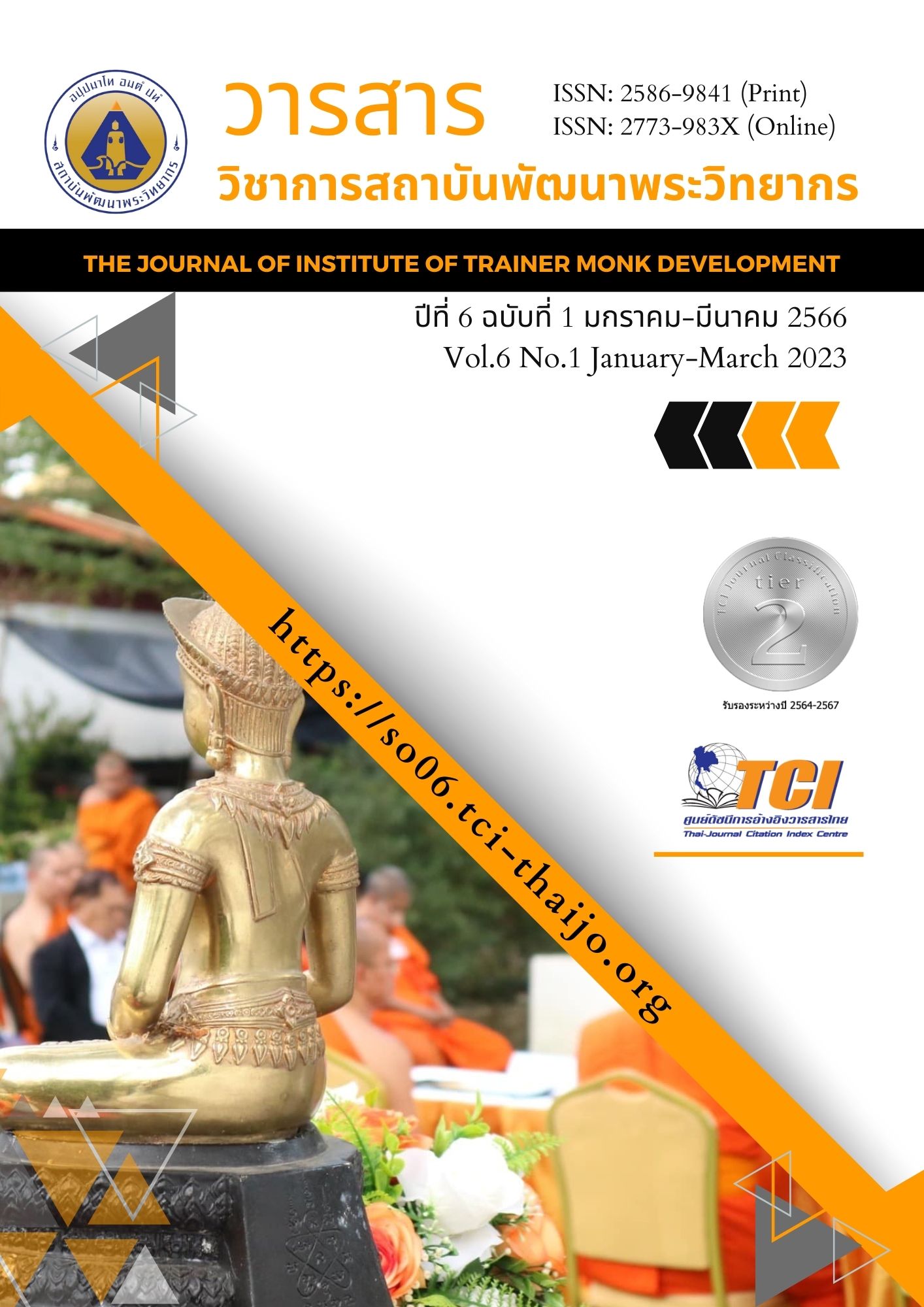Buddhism and Solving the Garbage Problem in Khlong Mai Subdistrict, Sam Phran District, Nakhon Pathom Province Integrated Buddhism
Main Article Content
Abstract
A research article on “Buddhism and Solving the garbage problem in Khlong Mai Subdistrict, Sam Phran District, Nakhon Pathom Province integrated buddhism” has the objectives: 1) To study the state of waste problems in Khlong Mai Subdistrict, Sam Phran District, Nakhon Pathom Province 2) To study the four principles of influence in solving waste problems. in Khlong Mai Subdistrict, Sam Phran District, Nakhon Pathom Province and 3) To integrate the Four Iddhibat Principles with solving waste problems in Klong Mai Sub-district, Sampran District, Nakhon Pathom Province. From the study, the following results are found:
- To study the state of waste problems in Khlong Mai Subdistrict, Sam Phran District, Nakhon Pathom Province found that waste management Requires a very high investment budget especially the use of incinerators It's a costly thing. And Waste management creates a reservoir of germs. cause environmental problems.
- To study the four principles of influence in solving waste problems. in Khlong Mai Subdistrict, Sam Phran District, Nakhon Pathom Province. It was found that each of the interviewees had opinions about the process according to the 4 Iddhibat Principles for waste management. must have a plan in order not to cause damage to the normal life.
- To integrate the Four Iddhibat Principles with solving waste problems in Klong Mai Sub-district, Sampran District, Nakhon Pathom Province found that 1) Things that should be integrated to solve waste problems according to the principle of power 4, we must understand the principle of self-integration in waste management planning 2) Work will be satisfying and loving towards the goal of doing that. want to do that To achieve the goal and 3) must understand Garbage disposal that it is extremely important to cultivate and cultivate consciousness for sustainable development.
Article Details

This work is licensed under a Creative Commons Attribution-NonCommercial-NoDerivatives 4.0 International License.
บทความที่ได้รับการตีพิมพ์เป็นลิขสิทธิ์ของวารสารวิชาการสถาบันพัฒนาพระวิทยากร
ข้อความที่ปรากฎอยู่ในบทความที่ได้รับการตีพิมพ์ในวารสาร ถือเป็นความรับผิดชอบของผู้เขียนบทความ และข้อคิดเห็นนั้นไม่ถือว่าเป็นทัศนะและความรับผิดชอบของกองบรรณาธิการวารสารวิชาการสถาบันพัฒนาพระวิทยากร
References
ดวงสมร ฟักสังข์. (2555). “หลักปรัชญาเศรษฐกิจพอเพียงกับการจัดการขยะมูลฝอยของครัวเรือนในชุมชนเขตดุสิตของกรุงเทพมหานคร”. รายงานการวิจัย. คณะวิทยาการจัดการ: มหาวิทยาลัยราชภัฏสวนสุนันทา.
ธงชัย ทองทวี. (2553). “สภาพปัญหาการจัดการขยะมูลฝอย องค์การบริหารส่วนตำบลหนองขามอำเภอจักราช จังหวัดนครราชสีมา”. วิทยานิพนธ์วิศวกรรมศาสตรมหาบัณฑิต. บัณฑิตวิทยาลัย: มหาวิทยาลัยเทคโนโลยีสุรนารี.
นภดล ศรีทองอ่อน และคณะ. (2560). “การบริหารจัดการขยะและขยะอันตรายในท้องถิ่น จังหวัดอุตรดิตถ์”. วารสารวิจัยและพัฒนาระบบสุขภาพ ปีที่ 10 ฉบับที่ 3 (กันยายน–ธันวาคม): 80.
ปริญญา ตรีธัญญา. (2562). การมีส่วนร่วมในการจัดการปัญหาขยะมูลฝอยของชุมชนตำบลงิ้วราย อำเภอนครชัยศรี จังหวัดนครปฐม. วารสารวิชาการแสงอีสาน มมร.อส 16(2), 499-513.
ปิยชาติ ศิลปะสุวรรณ. (2557). ขยะมูลฝอยชุมชน ปัญหาใหญ่ที่ประเทศกำลังเผชิญ, จุลสาร 4(7), 1-21.
มหาจุฬาลงกรณราชวิทยาลัย. (2539). พระไตรปิฎกภาษาไทย ฉบับมหาจุฬาลงกรณราชวิทยาลัย.กรุงเทพมหานคร: โรงพิมพ์มหาจุฬาลงกรณราชวิทยาลัย.
พระพรหมคุณาภรณ์ (2559). พจนานุกรมพุทธศาสตร์ฉบับประมวลธรรม. พิมพ์ครั้งที่ 34. กรุงเทพมหานคร: มูลนิธิการศึกษาเพื่อสันติภาพ.
สุนันทา พลทวงษ์, และคณะ. (2551). คู่มือแนวทางการลด คัดแยก และใช้ประโยชน์ขยะมูลฝอย. กรุงเทพมหานคร: บริษัท รุ่งศิลป์การพิมพ์จำกัด.
สุนันทา พลทวงษ์. (2561). คู่มือปฏิบัติการ 3 ใช้ (3R) เพื่อจัดการขยะชุมชน. พิมพ์ครั้งที่ 2.กรุงเทพมหานคร: บริษัท ฮีช์ จำกัด.
สุปราณี ศิริอาภานนท์. (2561). แนวทางการบริหารจัดการขยะรีไซเคิล:ประสบการณ์ต่างประเทศกับการประยุกต์ใช้ในประเทศไทย. วารสารรัฏฐาภิรักษ์ 60(1), 103-144.
องค์การบริหารส่วนตำบลคลองใหม่. (2563). การจัดเก็บขยะมูลฝอย. นครปฐม: บริษัท ทิพยาวรรณ อินเตอร์เนชั่นแนล จำกัด.


